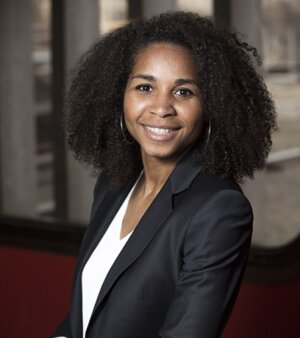Think Football 2019: "For a popular and festive Women's World Cup" (Laura Georges, FFF)
"The 2019 Women's World Cup in France must be popular and festive, and for this competition to be beautiful, we need to have our stadiums filled. For this reason, a study was conducted so that the tickets are accessible to all," explained Laura Georges, secretary general of the FFF, on 28/01/2019.
The former French international with 188 caps is the ambassador for the third edition of Think Football, the event organized by News Tank Football at INSEEC U. Sport (Eiffel Campus, 10 rue Sextius Michel, Paris, FRA), this Thursday 07/02/2019. As such, it is Laura Georges who will open the day, after the welcome from Fatma Samoura, FIFA secretary general and guest of honour of Think Football 2019.
At the FFF, "I have a mission that is the development and promotion of women's refereeing. This is a matter that must move forward, and this is for me a big goal. I also have a role of ambassador to the local organizing committee of the 2019 Women's World Cup, as well as a representative role of the president (Noël Le Graët) on certain issues," explained Laura Georges who answers questions from News Tank Football.
Think Football 2019: to register, click here
Think Football: to view the programme, click here
- How did you become a member of the executive committee and secretary general of the FFF
![]() Amateur Football Support Fund (Fonds d'Aide au Football Amateur in French)
at age 32, on 18/03/2017, while you were still active player?
Amateur Football Support Fund (Fonds d'Aide au Football Amateur in French)
at age 32, on 18/03/2017, while you were still active player?
Noël Le Graët (FFF president) said to me: "I wish you were part of my executive committee, so that you could give your opinion, share your vision. I know you are someone one who defends positions and who is not afraid to say things."
The same evening, after reflection and after having spoken with my relatives, I told him yes, that I would be delighted to join his executive committee.
- And the role of secretary general, did you know what exactly what this function was within the Federation?
In the organization of the Federation, my role is not a question of managing the strategic and commercial side, but of being able to communicate on the projects led by the FFF, and when one is member of the executive committee, this is also about carrying out very specific missions.
I think I am someone who likes to get involved. So I accepted that I was going to give what I know and be who I am. I think I have a lot to contribute, with my experience as a player, but also with what I learned through my studies and projects so that I can contribute to the future of football.
- Brigitte Henriques, secretary general during the previous term and now vice-president of the FFF since 18/03/2017, did she talk to you a lot?
Brigitte is my mentor to the Federation. We exchange regularly with respect to certain decisions and projects... She directs me and advises me. I speak with her very often. Afterwards, I solicit the view of people according to their responsibilities within the Federation, and there are also those that I knew as a player: this all helps me a lot. I also consult with the president...
- You have experienced, through the years 2017 and 2018, quite a lot, with your election to the FFF as both an active player and secretary general, then your six months at Bayern Munich, then the end of your of your playing career and now this position of No. 3 in protocol order of the FFF...
I do not have to make strategic or commercial decisions. I arrive in an administration that is already a well-oiled machine. I have a mission that is the development and promotion of women's refereeing. This is a matter that must move forward, and this is for me a big goal. I also have a role of ambassador to the local organizing committee of the 2019 Women's World Cup, as well as a representative role of the president (Noël Le Graët) on certain issues. This is how we signed a convention that links us with Costa Rica, to help this country to develop women's football, to play an advisory role to its coaching staff and for the development of the refereeing.
- You are therefore in charge of women's refereeing within the FFF?
For boys, there has been a 9% decrease in the number of referees and for girls, an increase of 4.5%: we are therefore in a positive phase on the female side, but we can not be content because there is one referee per 144 female players, whereas there is one referee per 67 male players. We need a lot more female referees for our women's matches at the youth level, because we have more and more competitions. To have a better elite women's football, we need a broader base and foundation. Today, we have 867 women referees, the goal is to reach 1,500 by 2021.
- How to do go about managing this?

1 - be given true responsibilities
2 - the ability to stay in football.
3 - be able to make a true career.
So we do not just need to make refereeing accessible as a hobby, but we need to make this a viable career, with referees who used to be players, (to referee for) for players at a high level. We must therefore offer career prospects.
- This development of women's refereeing is therefore a big job for you?
This is a big job, because refereeing is not the first activity we think about when we talk about football. Girls today are an essential representation of the registered players. We must therefore promote refereeing. This has a lot to contribute to the different actors in football: educators, leaders and players.

- Your other objective is the promotion of the 2019 Women's World Cup in France. What did you think of the draw for the final phase held in Paris (FRA) on 08/12/2018?
This ceremony made me happy, as it was original and atypical with good performances. There were some great football personalities with the FIFA Legends, who will accompany our World Cup. This is the first time that the international federation will propose such a device with these legends of world football. On the side of the organizing committee, the ticketing is going very well. I hope we will see the maximum number of full stadiums.
- One of the first priorities is to fill the stadiums during this tournament?
The 2019 Women's World Cup in France must be popular and festive, and for this competition to be beautiful, we need to have our stadiums filled. For this reason, a study was conducted so that the tickets are accessible to all.

- In terms of the legacy of this 2019 World Cup, what are the essential elements?
After the victory of les Bleus (French men's team) at Russia 2018, there was a 15% increase in female registrants. So the first element of the legacy is to have many more female players in our clubs. We also hope to have many more educators, women referees, leaders, volunteers... That's why the FFF will support the clubs in their structuring, with their equipment and training of their leaders, educators and referees. For example, in this World Cup year, referee training for women's and girls' football is free.

- And how does this involve the professional women's teams in France?
There have been meetings with all Division 1 and Division 2 professional teams to inform and encourage them to participate (in these programmes). All licensees have a 15% discount on World Cup tickets. There are also actions specifically geared toward professional clubs.
- Will there be the promotion of new professional women's championship?
I remind you that Canal+ broadcasts the female Division 1 in multiplex in France, this is a strong signal. The goal is to encourage leaders to invest in women's football. Some are already convinced. SM Caen, for example, will do this. Thi works to build (a women's section) from the ground up, without attaching itself to an existing women's club. Their women's section should arrive in 2019.

- Some leaders, like Jean-Michel Aulas in Lyon or Louis Nicollin in Montpellier were the precursors (in promoting professional women's football in France)...
Louis Nicollin believed in women's football, he employed two or three top talent players, and he decided to invest the means to bring them to the Montpellier women's team, who was then champion of France (in 2003-04 and 2004-05).
Jean-Michel Aulas has also invested in women's football with financial means, manpower and structures to develop the women's section of his club. The results did not come right away. When I began at the club, we struggled to qualify for the Women's Champions League final. We struggled a lot in the semi-finals, but then the machine was launched, and today there are specific sponsors for the Olympique Lyonnais women's team. A lot of money has been invested, but there is a return on this investment. In any case, the returns at the image level are impressive. The OL's women's team is the world's best (winner of the last 12 editions of the French championship and the last three Champions League)! Everyone recognizes the work that has been done. If this example can inspire other leaders...
- You played professionally in the United States as well as in Germany. What inspirations can be taken by French women's football to progress?
First, French women's professional football has nothing to envy on the others. The French stadiums are well-filled, compared to the Germans. I was a little disappointed in Germany, I found the organization of the championship a bit amateur. I returned to six-hour bus rides to go play a game, I played matches with handrails at the very edge of the pitch... Olympique Lyonnais has the best team in the world, and we (French Women's Division 1) sold our TV rights to Canal+ for five years. We are on the right path!
If we had to take something from the United States, it would be the craze and excitement for sport at the school and university levels. But that would mean completely changing the model, having infrastructures developed in universities, etc. Ah, if we could have a real high-level university championship... This would allow our players to make a choice between elite football and further education. As a reminder, in the United States, it is a law that has forced universities to invest in women's sport (at the same level of investment in men's sport).
- Last point: will you be a candidate again on the Executive Committee of the French Football Federation at the end of 2020?
That is still far away. I focus primarily on my missions during this term. The next step, I do not think about it.
- In 10 years, will you still be at the FFF?
I do not know. I think I will continue to share who I am, off the field.
- In football?
No doubt, at least in part. I will be in sport, anyway, I think.




 Amateur Football Support Fund (Fonds d'Aide au Football Amateur in French)
Amateur Football Support Fund (Fonds d'Aide au Football Amateur in French)
